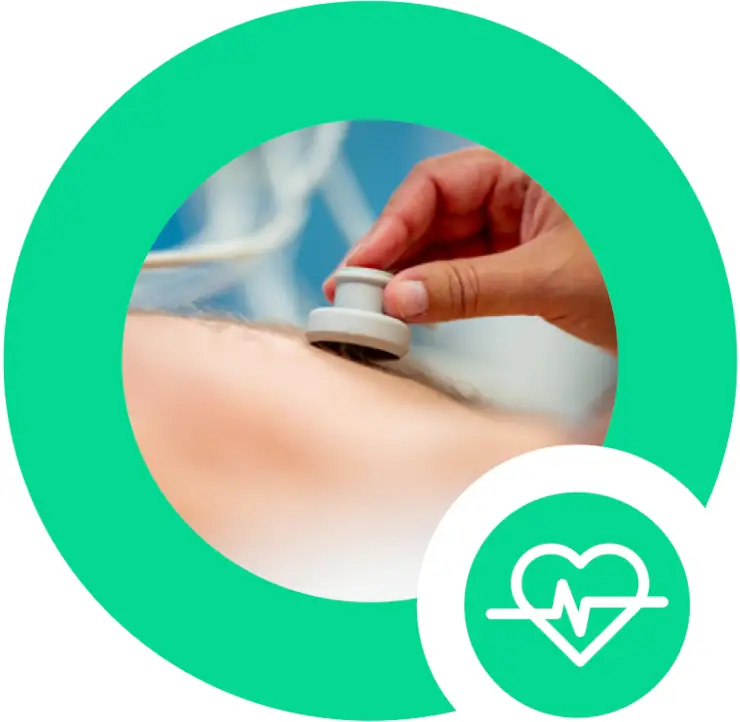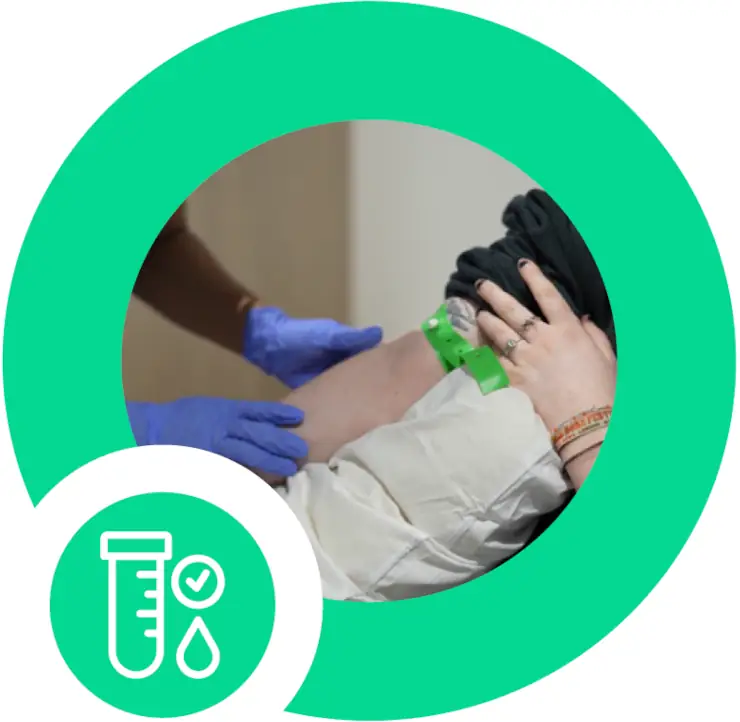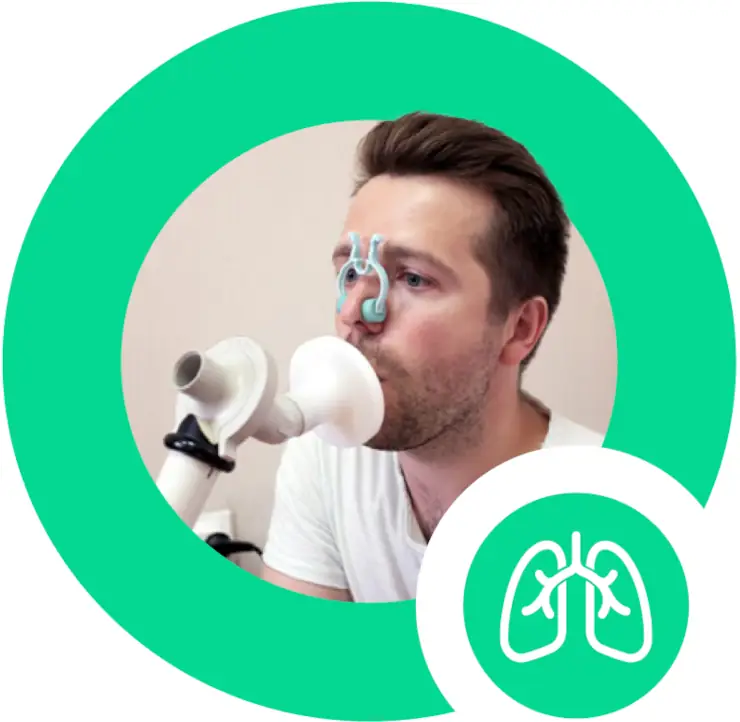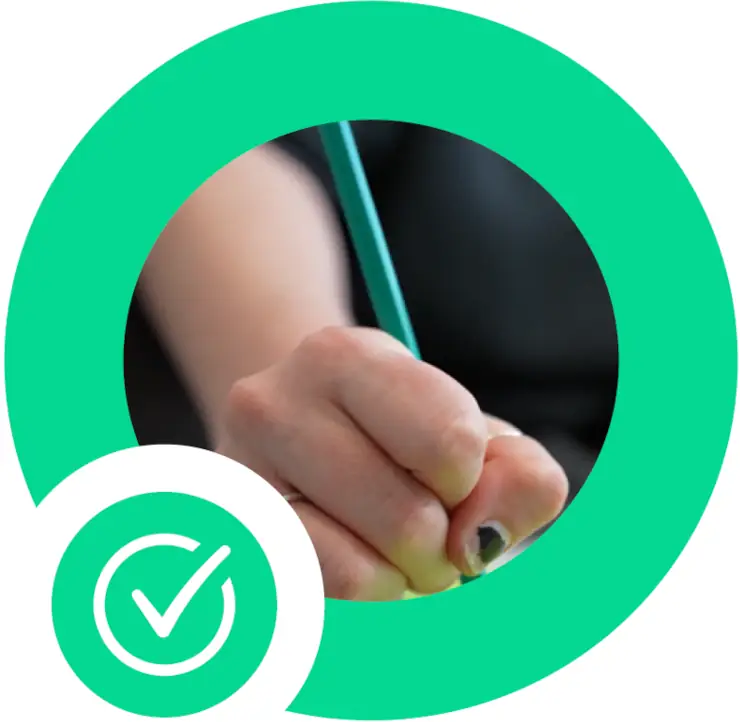Step 1: Medical Questionnaire
First, you’ll need to fill out a Medical Questionnaire. Please be as open and honest as possible about your past and current medical history, as well as any medications or supplements you are taking. This information helps us take the best care of your health and ensure your safety.

Step 2: Health Checks with a Clinical Support Specialist or Nurse
Next, a Clinical Support Specialist will guide
you through a series of tests*, including:
- Height, Weight, and BMI
- Urine Tests
- Cotinine (a nicotine breakdown product)
- Recreational Drug Screen
- Urinalysis (to check for signs of infection, dehydration, etc.)
- Pregnancy Test (if applicable)
- Alcohol Breath Test
- Vitals and Observations (measuring your heart rate, blood pressure, oxygen saturation, respiratory rate & temperature)

Step 3: ECG (Electrocardiogram)
- Measures the heart’s electrical activity.
- Stickers will be placed on your wrists, ankles, and chest, connected to the ECG machine with wires.
- Rarely, if there’s a lot of hair in the chest area, we may need to shave small areas to ensure accurate readings.
- We recommend avoiding bras with underwire for this test.
- Rest assured, we prioritise your privacy and dignity throughout the process.

Step 4: Blood Tests
- Full Blood Count
- Biochemistry (Kidney, Liver, Bone, Thyroid, and Electrolytes)
- HIV and Hepatitis Screen

Step 5: Spirometry
- Assesses your respiratory function.
- You’ll wear a nose clip and breathe through a mouthpiece connected to a spirometer.
- We may need you to blow into the spirometer 3 to 8 times to get accurate results.

If we detect any abnormalities, the Clinical Support Specialist or Nurse will check with a physician to decide if it’s safe to continue. If further input is needed, the physician can also communicate the findings to your GP with your permission.
*Disclaimer: Occasionally for some studies, we require some additional tests to be performed in relation to a specific condition or based on requirements. E.g. For Asthma Studies, in addition to the above tests, we also perform a Reversibility Test, which involves performing a Spirometry Assessment before and after using a Short-Acting Inhaler. We also have a wide variety of additional tests for Asthma Studies that may or may not be performed, therefore please be aware that this is not an exhaustive list.
Step 6: Doctor’s Review
After all assessments, you’ll meet with a doctor. The doctor will review your medical history and perform a clinical examination. You don’t need to remove all your clothing, but wearing loose, comfortable clothes is recommended.

Step 7: Final Eligibility Check
Lastly, we’ll wait for your blood test results to confirm if you meet the criteria for the specific study. This will determine your eligibility to proceed with enrolling in the clinical trial.
We’re here to support you every step of the way on your FluCamp journey. Please reach out to us at [email protected] if you have any questions or concerns.

Things to remember for your appointment...
- Your current, up-to-date passport or UK full or provisional driver’s license.
If you’re a non-UK citizen, dual national or born outside of the UK, please bring your passport as it’s the only accepted form of identification. We are unable to accept photocopies or scanned copies. - Proof of your national insurance number.
You can bring a payslip, national insurance card, or any other physical proof that you have available. - Inhalers (if applicable)
Please bring all of the inhalers you are prescribed with you to your appointment.

What to wear
A full clinical examination will be performed, but you will not be required to remove all your clothing. We will need to be able to access the top of your arms and your chest for the ECG, so we would recommend wearing a loose t-shirt you can pull down or a buttoned top. Loose and comfortable clothing is recommended to facilitate all assessments. If applicable, please wear a non-underwired bra, as underwires can interfere with the ECG.

Get ready for your health check by viewing the helpful educational video about spirometry testing below.